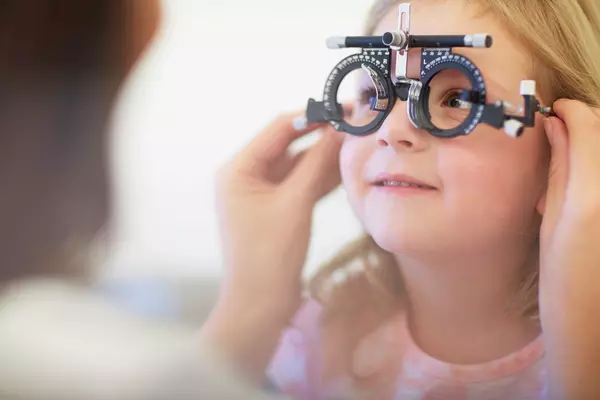
Optometry Residency Curriculum
Our Optometry residents focus on clinical care with space to learn, research and teach during our year together that begins at the end of June.
Training overview
Optometry residents work approximately 40 hours per week during these one-year (52-week) programs. You’ll spend most of your time caring for patients in Gundersen Eye Clinic La Crosse as well as our regional eye clinics. Residents rotate through Ophthalmology & Optometry subspecialty clinics to gain knowledge and skills in managing ocular diseases and surgical cases. You’ll see primary care patients, ocular disease cases and walk-in emergency patients. We also allow time for academic work, such as case conferences, research, independent study and lecturing. Residents do not have on-call responsibilities.
Residencies caseload
Whether you’re enrolled in our Optometry with Ocular Disease Focus or Optometry in Ocular Disease with emphasis on Neuro-Optometric Rehabilitation residency, you’ll oversee your patients’ care under the guidance of our clinicians.
Optometry with Ocular Disease Focus Residency caseload
You’ll have opportunities to:
- Observe cataract, glaucoma, corneal, oculoplastic, retinal and refractive surgeries
- Manage or observe post-operative care
- Observe and work with retinal, glaucoma and corneal specialists
- Work in the Traumatic Brain Injury/Low Vision Clinic
- Work 1-2 days a week at Gundersen’s regional eye clinics (vehicle for travel is provided)
- Participate in inter-professional education with Neurology, Radiology, Endocrinology, Rheumatology and more
Optometry in Ocular Disease with an emphasis on Neuro-Optometric Rehabilitation caseload
You’ll have the opportunities to:
- Manage patients with traumatic and other brain injuries at the La Crosse Eye Clinic
- Work with Vestibular Therapy, Occupational Therapy, Physical Medicine & Rehabilitation and other specialties to coordinate care for patients with brain injuries
- Participate in inpatient rounds for patients who have suffered brain injuries
- Work 2-3 days per week at Gundersen’s regional eye clinics (vehicle for travel is provided)
- Participate in inter-professional education with Neurology, Radiology, Endocrinology, Rheumatology and more

Research
During your residency, you’ll design a retrospective research project and author a paper that’s suitable for publication.
Curriculum
Time allocation
On average, you’ll spend:
- 24-36 hours weekly working in the Resident Clinic in La Crosse
- 8 hours weekly working in a regional clinic for 8 hours a week
- 8 hours weekly rotating between:
- An additional day in a regional clinic (once a month)
- Specialty ocular disease clinics working with an ophthalmologist (once a month)
- Research (once a month)
- Inter-professional education (once every 1-2 months)
- Walk-in Emergency Clinic (once a month)
- Observation in Surgery (once every 1-2 months)
Direct patient care
You’ll complete rotations in the La Crosse Ophthalmology/Optometry subspecialty clinics to learn how to manage and co-manage ocular diseases and surgical cases in subspecialties clinics, such as glaucoma, retina, cornea, oculoplastics and pediatrics. You’ll have your own clinic in La Crosse once you’ve reached clinical competency. You’ll also spend time in Gundersen regional eye clinics, seeing primary care patients, ocular disease cases and walk-in emergency patients.
Academic work
As part of your scholarly work, you’ll:
- Submit case reports for review at academic meetings, such as American Academy of Optometry, SECO, NORA and Heart of America
- Lecture at Dr. Ken Purdue Optometric Annual Review, Indiana University School of Optometry Fourth Year Case Conference, and, if selected, at national meetings
- Participate in and lead Journal Club Discussion
- Conduct a quality improvement or research project with the help of our Medical Research department
- Attend continuing education conferences
Goals for Ocular Disease Clinic
You reach these goals through patient care in the Ocular Disease Clinic, supervised by Optometry and Ophthalmology preceptors.
1) To enhance your skills and efficiency in the diagnosis and management of ocular diseases, including but not limited to:
- Glaucoma
- Vitreo-retinal disorders
- Retinal vascular disorders
- Systemic disease correlation
- Cataracts and post-operative complications of cataract surgery
- Age-related macular degeneration and other macular pathology
- Neuro-ophthalmic emergencies including neurological exam screenings
- Corneal, external ocular disease and post-operative refractive surgery cases
2) To grow proficient in the testing and interpretation of advanced diagnostic equipment, including:
- OCT
- RightEye
- Pachymetry
- Ultrasonography
- Digital photography
- Automated Perimetry - Humphrey Visual Field Technology
3) To enhance skills of advanced diagnostic procedures, including:
- Gonioscopy
- Scleral indentation
4) To enhance decision-making for appropriate referrals to ophthalmic and non-ophthalmic medical providers and for laboratory and neuro-imaging studies
Goals for regional clinics
1) To enhance your skills to diagnose and manage:
- Ocular trauma
- Uveitis
- Anterior segment infections
- Foreign bodies
- Ocular allergies
- Contact lens-related problems
2) To become proficient in the interpretation of laboratory and imaging studies and diagnosing visual problems associated with brain injuries
3) To enhance the intra- and inter-professional communication with nurse practitioners, physician assistants and doctors as you collaborate on complex cases
Why Gundersen

Call La Crosse Home
We have it all in La Crosse, Wis. Our vibrant city and region support your dream lifestyle with a welcoming community, culture and outdoor adventure.

Housing
Steps from our flagship medical center in La Crosse, our housing options allow you to enjoy the company of your family and the comradery of your colleagues.

Prioritizing Your Wellness
As you learn how to become the clinician you aspire to be, we’ll provide space to prioritize your mind and body wellness, and reach the work-life balance you need.